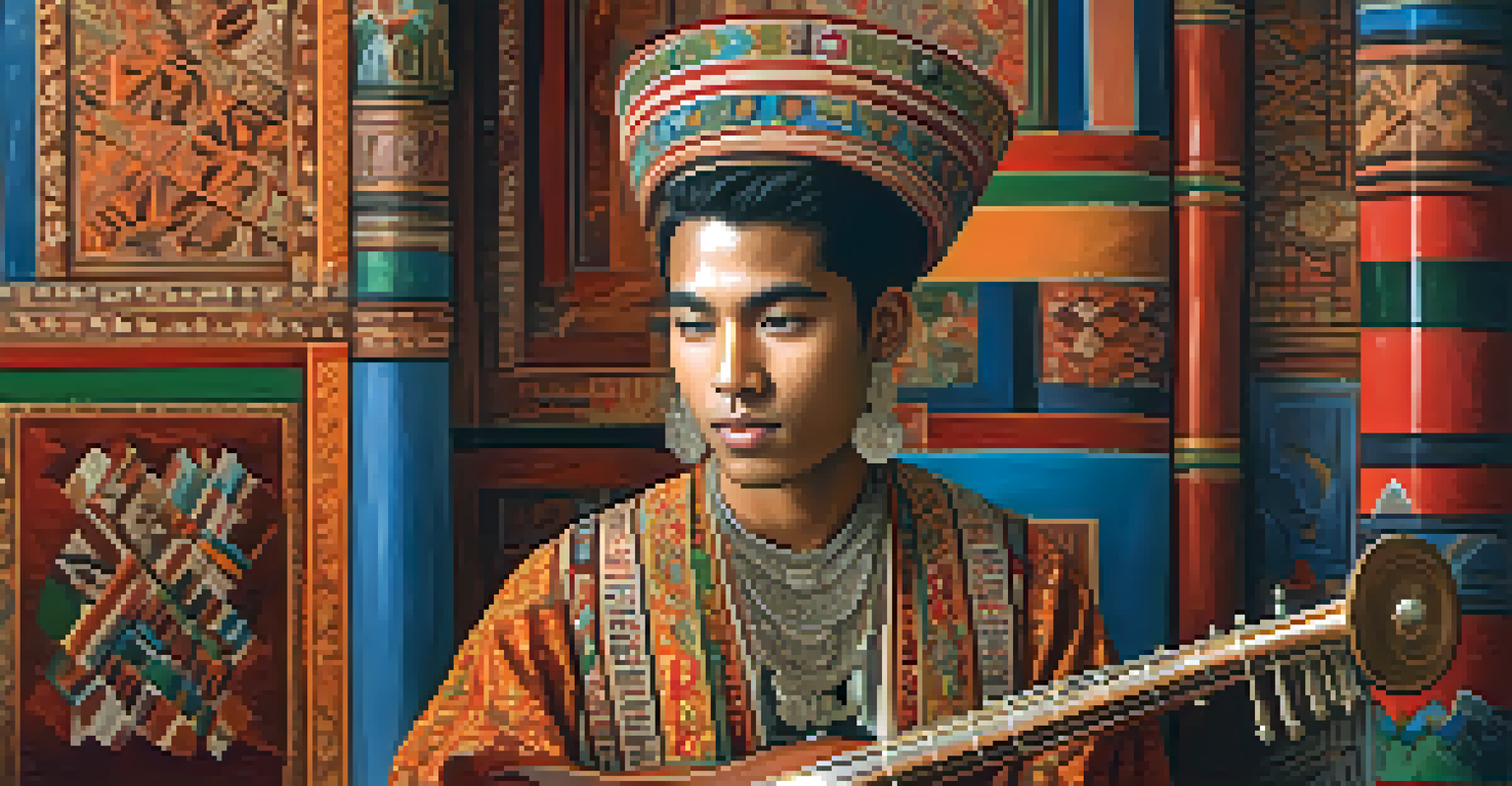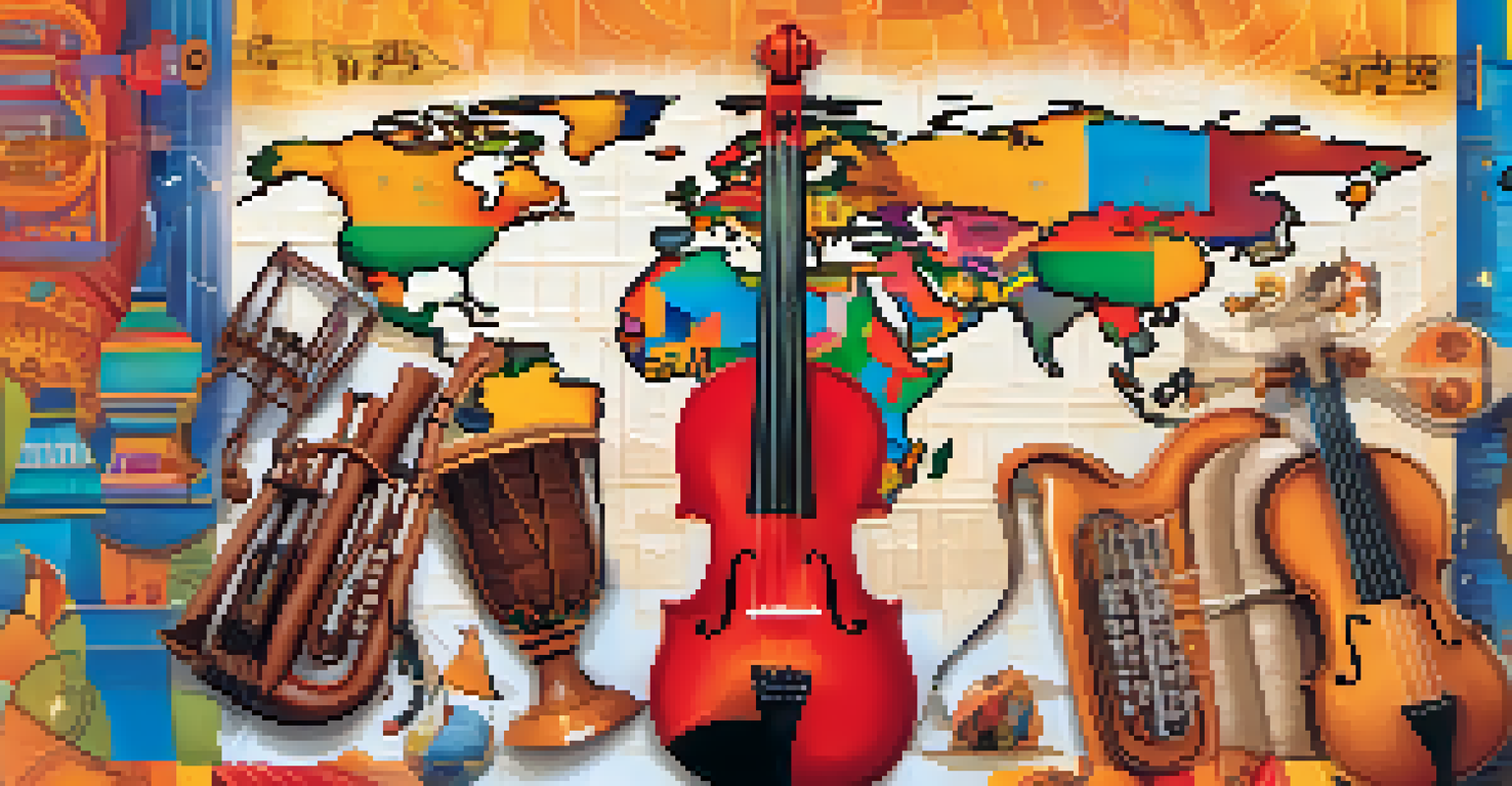How Music Inspires Conversations Across Diverse Cultures

The Universal Language of Music: A Common Ground
Music is often described as a universal language that transcends borders. Regardless of where you are from, the rhythm and melody can evoke emotions that are universally understood. When people from different cultures come together to enjoy music, they often find common ground that encourages dialogue and connection.
Music is the universal language of mankind.
For instance, think about how a catchy tune can get people dancing together, even if they don’t speak the same language. This shared experience can serve as an icebreaker, fostering conversations that might not have happened otherwise. In this way, music acts as a bridge, linking diverse backgrounds in a celebration of creativity and expression.
Ultimately, the ability of music to inspire conversations lies in its emotional resonance. When people hear familiar sounds or melodies, it often sparks memories and feelings that they are eager to share. This connection can lead to rich exchanges about personal experiences, cultural traditions, and artistic influences.
Music Festivals: Celebrating Diversity Through Sound
Music festivals are a prime example of how music inspires conversations across cultures. These events often gather artists and audiences from various backgrounds, showcasing an eclectic mix of genres and styles. In this vibrant atmosphere, attendees can engage in dialogue, sharing their interpretations of the music and what it means to them.

Take, for instance, the global phenomenon of the Coachella Valley Music and Arts Festival. It not only features a diverse lineup of artists but also attracts a melting pot of attendees, each bringing their unique cultural perspectives. This diversity creates a rich tapestry of conversations that extend beyond just music, allowing individuals to learn from one another.
Music Unites Across Cultures
Music serves as a universal language, fostering connections and conversations among people from diverse backgrounds.
Additionally, these festivals often include workshops and discussions, further encouraging cultural exchange. Participants can explore the stories behind the songs and the influences that shape different musical traditions, deepening their understanding of the world around them.
The Role of Music in Cultural Identity and Expression
Music serves as a powerful tool for individuals to express their cultural identities. Through songs, artists can convey their heritage, values, and experiences, inviting listeners to share in their world. This sharing creates opportunities for conversations that celebrate differences while highlighting commonalities.
Where words fail, music speaks.
For example, artists like Residente from Puerto Rico use their music to address social issues and reflect their cultural roots. By sharing these narratives, they spark conversations about identity, history, and the struggles faced by their communities. This not only educates listeners but also fosters empathy and understanding.
Moreover, as people engage with music from different cultures, they often find themselves inspired to explore new sounds and traditions. This curiosity can lead to meaningful discussions about cultural appreciation versus appropriation, encouraging deeper connections and respect among diverse groups.
Collaborative Music Projects: Bridging Cultural Gaps
Collaborative music projects are an excellent way to bring together artists from various cultures to create something unique. When musicians combine their talents and styles, they not only enrich their own work but also create a platform for cross-cultural dialogue. These collaborations can result in innovative sounds that resonate with a wider audience.
One notable example is the collaboration between African and Western artists in the genre of Afrobeat. This fusion showcases how different musical elements can come together to create a vibrant soundscape that tells stories from both cultures. As these artists work together, they often engage in conversations about their influences, leading to mutual respect and understanding.
Festivals Showcase Cultural Diversity
Music festivals create vibrant spaces where attendees can engage in dialogue, sharing their unique cultural perspectives.
Such projects can also educate listeners about the history and significance of different musical traditions. As fans discover the roots of a collaborative piece, they are encouraged to learn about the cultures behind the sounds, fostering a greater appreciation for diversity in music.
Music as a Catalyst for Social Change and Dialogue
Throughout history, music has played a significant role in advocating for social change. Artists often use their platforms to address pressing issues, sparking conversations that transcend cultural boundaries. Through their lyrics and performances, they invite audiences to reflect on societal problems and envision a better future.
Consider the impact of protest songs, such as Bob Dylan's 'Blowin' in the Wind,' which resonated with audiences during the civil rights movement. These songs not only united individuals in their fight for justice but also inspired conversations about equality and human rights across different cultures. They remind us that music can be a powerful voice for change.
Furthermore, contemporary artists continue this tradition by addressing global issues through their music. By highlighting themes like climate change or social injustice, they encourage listeners worldwide to engage in important dialogues, fostering a sense of global community.
The Influence of Technology on Cross-Cultural Music Conversations
In recent years, technology has revolutionized the way we discover and share music from different cultures. Streaming platforms and social media have made it easier for artists to reach global audiences, breaking down geographical barriers. This accessibility has led to a richer exchange of musical ideas and cultural narratives.
Platforms like Spotify and YouTube allow users to explore diverse playlists and discover artists they may never have encountered otherwise. As people listen to music from around the world, they are often inspired to engage in conversations about the cultural significance of these sounds, fostering a greater understanding of global diversity.
Technology Drives Global Music Exchange
Advancements in technology have enhanced the accessibility of music, promoting cross-cultural conversations and understanding.
Moreover, social media enables artists to connect with fans directly, allowing for real-time discussions about their work. This interaction not only enhances the listener's experience but also creates a sense of community among fans from various backgrounds, promoting cross-cultural dialogue on a larger scale.
The Future of Music and Cultural Conversations
As the world becomes increasingly interconnected, the role of music in fostering cultural conversations is likely to grow. The blending of genres and influences reflects the diverse experiences of our global community. This evolution presents an exciting opportunity for artists and listeners alike to engage in meaningful dialogue about their cultural identities.
Furthermore, as new technologies continue to emerge, we can expect even more innovative ways for music to inspire conversations. Virtual concerts, augmented reality experiences, and AI-generated music will provide fresh avenues for cross-cultural engagement, allowing people to connect in ways previously unimaginable.

Ultimately, the future of music lies in its ability to unite us through shared experiences. By embracing the diversity of musical traditions and encouraging open conversations, we can foster a deeper understanding of each other and build a more inclusive world.